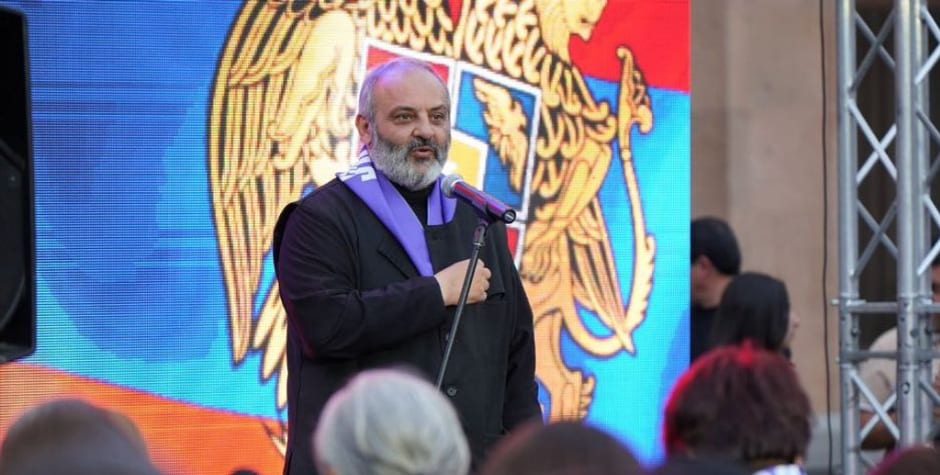

Pashinyan vs. the Church: Armenia on the Brink of Fracture
Pashinyan vs. the Church: Armenia on the Brink of Fracture
The attempted coup by Archbishop Bagrat Galstanyan in Armenia reveals the widening rift between the Armenian Apostolic Church and Prime Minister Nikol Pashinyan. With its survival looming, Armenia is now seemingly willing to make any concession to Turkey and Azerbaijan in order to break its international isolation.
Prime Minister Nikol Pashinyan announced on June 25, 2025 that an attempted coup was foiled in Armenia. According to him, the “criminal oligarchic clergy” had orchestrated a large-scale destabilization plan involving religious figure and opposition leader, Archbishop Bagrat Galstanyan. Searches were conducted at the residences of the archbishop and about thirty of his associates. One of his political allies, MP Garnik Danielian, denounced the accusations as the tactics of a “dictatorial regime.”
Nikol Pashinyan in open conflict with the Armenian Apostolic Church
These tensions are the continuation of a long-standing conflict between the Prime Minister and the Armenian Apostolic Church. Although Armenia is officially a secular country, the Church enjoys a special constitutional status (Article 18 of the Armenian Constitution) and wields significant moral and social influence. On June 10, 2025, Nikol Pashinyan called for the “liberation” of the Church and new elections to replace its leader, Catholicos Karekin II after he publicly criticized Pashinyan after the loss of Nagorno-Karabakh. At the end of May 2025, Pashinyan and his wife even suggested that Karekin II had a child, violating of his vow of celibacy — a claim that triggered sharp criticism and calls for the couple’s excommunication.
Armenia Ready to Make Every Concession for a Peace Deal with Azerbaijan
This tense situation comes as the Armenian government attempts to negotiate a peace agreement with Azerbaijan, a country with which Armenia has fought several wars over control of Nagorno-Karabakh. In September 2023, an Azerbaijani offensive backed by Turkey put an end to the millennium-old Armenian presence in the region forcing more than 120,000 Armenians into exile. Despite difficult negotiations since then, relations between Baku and Yerevan have continued. In March 2025, a peace agreement was announced, attempting to memorialize mutual recognition of borders, the dissolution of the Minsk Group, and the termination of reciprocal international legal actions. However, Baku demands that Armenia amend its Constitution to remove all references to Nagorno-Karabakh. The exact contents of the agreement remain vague, which continues to delay its signing. The question of the release of Armenian hostages held in Baku—an issue the European Centre for Law and Justice is actively advocating—is notably absent from the discussions.
The Armenians Killed in the 1915 Genocide Killed a Second Time
Despite opposition from the Church, the diaspora, and a segment of the population, Pashinyan is determined to end Armenia’s isolation—even at the cost of national humiliation. On June 20, 2025, for only the second time since taking office in 2018, Pashinyan traveled to Turkey for a highly symbolic visit. The aim for his meeting with President Recep Tayyip Erdogan in Istanbul was to normalize relations between the two countries, which have never established diplomatic ties and whose shared border has been closed since the 1990s. In March 2025, Pashinyan announced that Armenia would no longer pursue international recognition of the Armenian genocide, which has been recognized to date by 34 countries, including the United States, France, Germany, Brazil, and Russia. This major concession means that the 1.5 million Armenians killed between 1915 and 1916 are symbolically killed a second time.
Furthermore, President Erdogan “emphasized the importance of the consensus in the ongoing peace negotiations between Azerbaijan and Armenia, given the circumstances, and stated that Turkey would continue to fully support efforts to develop the region through a win-win approach.” This statement should be viewed with caution, as historically, Turkey is an ally of Azerbaijan—two nations bound by a shared Turkic origin (“One Nation, Two States”) and the production and transit of hydrocarbons to Europe via the Caspian Sea. Finally, Erdogan and Pashinyan also discussed the conflict between Israel and Iran, the latter of which shares a border with both Turkey and Armenia.
Isolated, Armenia Fights for Its Survival
Currently, the Armenian society is marked by deep fatigue. According to a survey conducted in the spring of 2025, more than 86% of Armenians want to be able to review the peace agreement before it is signed. While 36% of Armenians favor early parliamentary elections, 17% still support the current Prime Minister. Despite this division, all Armenians share a common feeling of constant insecurity. Armenia walks a tightrope—between uncertain peace, political crisis, and spiritual rupture. For Pashinyan, the painful yet inevitable pragmatism in the face of an overwhelming imbalance of power compels him to normalize relations with Turkey and to pursue peace with Azerbaijan. The central issue remains the preservation of Armenia’s territorial integrity.
SIGNATURES













